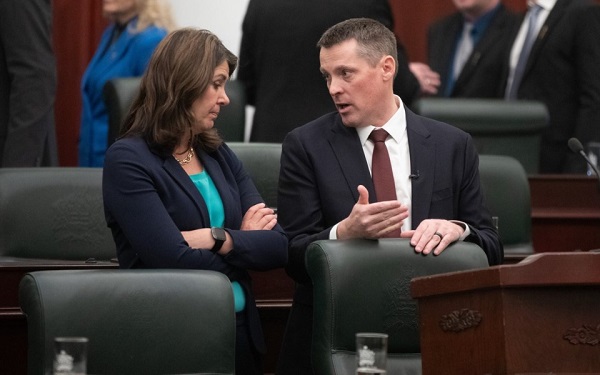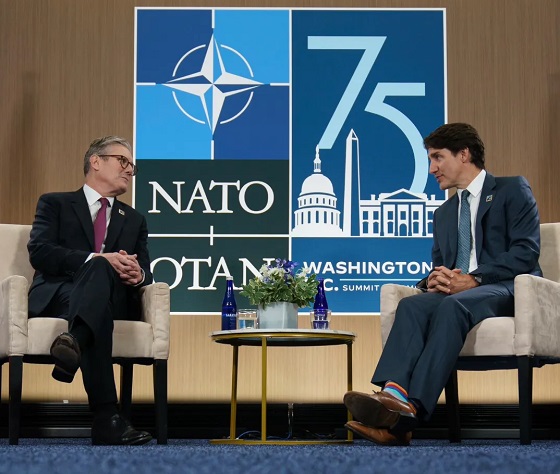Alberta
Provincial Budget 2025: Meeting the challenge

To help Albertans with the high cost of living, Budget 2025 delivers on the promised tax cut that will save Albertans hundreds of dollars starting this year. The new eight per cent personal income tax bracket for income up to $60,000 is starting two years ahead of schedule and will save Albertan families up to $1,500 in 2025.
To meet the needs of a population that has grown rapidly in the last few years, Budget 2025 also makes the highest-ever investment in health care and education while moving forward with the Alberta government’s commitment to build schools and classroom spaces faster. The budget continues to support vulnerable Albertans and keep communities and provincial borders safe while supporting the economy, communities and sectors outside the oil and gas industry.
“Budget 2025 is a budget of tough but measured choices that meet the needs of Albertans and maintains our Alberta advantage. It cuts taxes, steadfastly supports public services and solidifies our economic foundation so it can withstand future headwinds.”
Budget 2025 takes a cautious approach in its economic outlook, reflecting the high risk of a Canada-U.S. trade conflict and the potential significant impact on the Alberta economy. The outlook assumes a moderate trade conflict where Canada will face an average 15 per cent tariffs on all goods, while energy products will face a 10 per cent tariff. Alberta will continue to work with federal, provincial and territorial partners to find solutions. Even in light of tariffs, the province expects moderate but continued growth in oil production and investment to keep the province’s economic engine humming. Alberta’s responsible crude oil exports are expected to continue to meet critical U.S energy needs, and the Trans Mountain Pipeline expansion will provide more export capacity for producers.
Investment will continue in existing major projects that are driving activity in industrial building construction, including Dow’s Path2Zero project, Air Products’ new hydrogen facility and Imperial Oil’s Strathcona Refinery renewable diesel expansion project.
Alberta’s housing market is expected to stand out as a bright spot in the economy as homebuilders work to meet the needs of a growing population A slower population growth will help the labour market gradually rebalance over the next few years.
While the province is facing significant economic uncertainty and revenue volatility, the government remains committed to making prudent spending decisions to keep operating expense growth below population growth plus inflation and to sustainably deliver important programs and services to Albertans and Alberta businesses.
Budget 2025 invests:
- $9.9 billion in operating expenses for education, an increase of 4.5 per cent from 2024-25, to help with enrolment pressures, hire more teachers and other educational staff, and support complex classrooms and students.
- $2.6 billion over three years for educational (K-12) infrastructure, an increase of $505 million or 23.9 per cent from Budget 2024. This funding will support the construction of more than 200,000 new and modernized student spaces over the next seven years (almost 90,000 within the next four years).
- $28 billion in operating expense, an increase of $1.4 billion or 5.4 per cent, across the refocused health care system including:
- $22.1 billion to health care to improve access to quality health services close to home, prioritize patients, build capacity at hospitals and rural facilities, expand surgeries and compensate and retain health professionals.
- $1.7 billion for implementing the compassionate intervention framework and Recovery Alberta Services.
- $3.8 billion to focus on making the full continuum of care available to all Albertans, from assisted living, home care and community care, to housing and social supports with wraparound social services.
- $1.3 billion for operating expense for Public Safety and Emergency Services, an increase of 3.7 per cent from 2024-25, to support Alberta Sheriffs, Correctional Services and emergency management in the work to keep Alberta communities safe and secure the southern border.
- $1.6 billion, or a six per cent increase from last year, for Children and Family Services to strengthen the programs vulnerable children and families rely on.
- $6.2 billion, or an 8.8 per cent increase from 2024-25, to support core social programs, including a short-term bump to support more people affected by potential U.S. tariffs and rising grants for housing programs.
- Overall, Budget 2025’s Capital Plan includes $26.1 billion over three years, an increase of 4.4 per cent or $1.1 billion more than Budget 2024, to meet the challenge of growth and build and enhance schools, hospitals, roads and bridges in the province. The plan is projected to support an average of 26,500 direct and 12,000 indirect jobs annually through 2027-28.
The province is also continuing to focus on building the Heritage Fund to $250 billion by 2050. The fund was valued at $25 billion in the third fiscal quarter of 2024-25 and is expected to grow to about $27 billion by the end of the fiscal year. A renewed Heritage Fund that earns money year over year will secure a resilient and prosperous Alberta for generations to come and lessen the province’s reliance on natural resource revenues. An independent board of directors and a new Heritage Fund Opportunities Corporation will unlock access to new opportunities and partnerships with global sovereign wealth funds.
Revenue
- Total revenue in 2025-26 is forecast at $74.1 billion, a decrease of $6.6 billion from the 2024-25 forecast of $80.7 billion. Total revenue is forecast to grow to $77.4 billion in 2026-27 and $80 billion by 2027-28, with broad-based revenue growth led primarily by income taxes.
- The decrease in 2025-26 comes mainly from a $4.4 billion drop in non-renewable resource revenue, driven by an anticipated decline in oil prices. This revenue source is forecast at $17.1 billion in 2025-26, compared to the $21.5 billion forecast for 2024-25.
- Revenue from personal income taxes is estimated to decrease to $15.5 billion in 2025-26, down from the $16.1 billion at the third quarter, due to the new eight per cent income tax bracket and negative impacts associated with potential tariffs. Personal income tax revenue is forecast to grow moderately in the following two years as more people continue to move to Alberta.
- Corporate income tax revenue is estimated at $6.8 billion in 2025-26, down $586 million from the third-quarter forecast for 2024-25, but rising over the next two years.
Expense
- Total expense in 2025-26 is forecast at $79.3 billion, an increase of $4.4 billion or 5.9 per cent from the 2024-25 third quarter forecast.
- Total expense is expected to be $79.8 billion in 2026-27 and $82 billion in 2027-28, or an increase of about 1.7 per cent per year.
- Operating expense is estimated at $64.3 billion, an increase of $2.2 billion or 3.6 per cent from the 2024-25 third quarter forecast.
- Operating expense grows to $64.8 billion in 2026-27 and $66.5 billion in 2027-28, an average increase of 1.7 per cent per year.
- A contingency of $4 billion will help to provide government with more flexibility to address unforeseen implications of increased economic uncertainty as well as compensation expense for collective bargaining currently underway.
Deficit
- A deficit of $5.2 billion is forecast for 2025-26.
- The deficit is forecast to drop to $2.4 billion and $2 billion for 2026-27 and 2027-28, respectively.
- The government’s fiscal framework includes allowable exceptions for when the government can run a deficit, including when there is a significant drop in revenue.
- This deficit is largely the result of falling non-renewable resource revenues and increases in costs necessary to provide world-class services to Albertans.
Debt
- Debt servicing costs are forecast to decrease by $231 million in 2025-26 from the 2024-25 forecast, to $3 billion, as funds pre-borrowed in 2024-25 will be used to repay sizeable debt maturities coming due in early 2025-26.
Economic Outlook
- In 2025, real gross domestic product is expected to decelerate to 1.8 per cent, then 1.7 per cent in 2026.
- Population growth is expected to moderate, growing at 2.5 per cent in the 2025 census year, down from the record 4.4 per cent growth in 2024. Growth will shift down to 1.4 per cent over the following two years, then 1.6 per cent in 2028.
Energy and economic assumptions, 2025-26
- West Texas Intermediate oil (USD/bbl) $68
- Western Canadian Select @ Hardisty (CND/bbl) $73.10
- Light-heavy differential (USD/bbl) $17.10
- ARP natural gas (CND/GJ) $2.50
- Conventional crude production (000s barrels/day) 519
- Raw bitumen production (000s barrels/day) 3,558
- Canadian dollar exchange rate (USD¢/CAD$) 69.60
- Interest rate (10-year Canada bonds, per cent) 3.10
Related information
Alberta
Jason Kenney’s Separatist Panic Misses the Point

By Collin May
Time was a former political leader’s expected role was to enjoy retirement in relative obscurity, resisting the urge to wade into political debate. Conservatives generally stick to that tradition. Ralph Klein certainly did after his term ended. Stephen Harper has made no attempt to upstage his successors. Yet former Alberta Premier Jason Kenney can’t seem to help himself.
From the boardroom of Bennett Jones, one of Calgary’s oldest law firms, Kenney recently offered his thoughts on the unspeakable horrors that await the province should it entertain a debate (perhaps even call a referendum) on separating from Canada. While dismissing Alberta separatists as a “perennially angry minority”, Kenney nevertheless declared a vote on separation would “would divide families, divide communities, divide friends for no useful purpose.” Business partnerships, church and community groups, even marriages and families would break apart, he warned, “shredding the social fabric of the province.”
It was a remarkable burst of untethered hyperbole, but it says more about the former premier than it does about the province he once led.
Kenney’s take on the history of Alberta separatism is telling. It’s a 50-year-old “discredited concept,” he said, whose acolytes “couldn’t get elected dogcatcher in this province.” Exhibit A in his analysis was Gordon Kesler, an Alberta rodeo rider and oil company scout who believed independence was the only way to save Alberta from Ottawa’s depredations. In a 1982 byelection, Kesler got himself very much elected as an MLA under the Western Canada Concept banner. He later lost in the general election to Peter Lougheed’s Progressive Conservatives, but Lougheed did not belittle Albertans for entertaining separatist notions. Instead, he asked for a mandate to fight Ottawa more effectively — and got it.
Kenney, by contrast, ridicules separatists while simultaneously painting them as an existential menace. Worse, he likens them to followers of Vladimir Putin and (perhaps even worse?) Donald Trump. “[I]f you just follow them on social media,” he claimed, one will quickly see that they cheered on Putin’s attack on Ukraine and Trump’s threat of making Canada the 51 st state.
Kenney’s latest intervention fits a pattern. As premier from 2019 to 2022, he could not resist trying to stamp out dissent. During the pandemic, he alienated political allies by dismissing their concerns about mandatory vaccines with contempt. He saw his ouster as UCP leader as the result of a Trumpian-inspired or “MAGA” campaign. UCP party faithful, however, said their rejection of him had far more to do with his top-down leadership style and habit of “blaming other people for the errors he made.”
What’s especially striking about Kenney’s separatist obsession is that he seems to understand as little about Albertans now as he did while premier. Albertans have long debated separation without the province descending into chaos. When Kesler won his seat, people talked about separation, argued its pros and cons, but couples were not running to their divorce lawyers over the issue and business partners were not at each other’s throats.
And there are legitimate reasons for concern about Canada’s social and political structure, as well as the role provinces play in that structure. Canada’s institutions operate largely on an old colonial model that concentrates power in the original population centre of southern Ontario and Quebec. This has not, and does not, make for great national cohesion or political participation. Instead, it feeds constant fuel to separatist fires.
The current threat to Canadian identity comes as well from the ideological commitments of our federal government. Early in his time as Prime Minister, Justin Trudeau declared Canada to be a “post-national” state. This sort of moniker is consistent with the popularly-designated woke doctrine that eschews the liberal nation-state, democratic procedures and individual freedom in favour of tribalist narratives and identity politics.
The obsession with post-nation-state policies has initiated the dissolution of the Canadian nation regardless of whether Quebeckers or Albertans actually vote for separation. We are all becoming de facto separatists within a dissolving Canada, a drift that current Prime Minister Mark Carney’s ineffective “elbows up” attitude has done nothing to reverse.
Kenney’s panicked musings about Alberta separatists would have us believe the province need only continue the fight for a better deal within the Canadian federation. Kenney pursued just such a policy, and failed signally to deliver. For too many Albertans today, his advice does not reflect the political reality on the ground nor appreciate the worrying trends within Canadian institutions and among our political class.
Kenney likes to associate himself with Edmund Burke, the father of conservatism and defender of venerable institutions. But Burke was known as much in his day for his sympathies with the American revolutionaries and their creation of an experimental new republic as he was for his contempt towards the French Revolution and its Reign of Terror. Burke’s conservatism still linked real actions with true words. It would be advisable, perhaps, to keep our own political language here in Alberta within the bounds of the plausible rather than fly off into the fanciful.
The original, full-length version of this article was recently published in C2C Journal.
Collin May is a lawyer, adjunct lecturer in community health sciences with the Cumming School of Medicine at the University of Calgary, and the author of a number of articles and reviews on the psychology, social theory and philosophy of cancel culture.
Alberta
Alberta puts pressure on the federal government’s euthanasia regime

From LifeSiteNews
Premier Danielle Smith is following through on a promise to address growing concerns with Canada’s euthanasia regime.
Alberta Premier Danielle Smith has sent a mandate letter to Justice Minister Mickey Amery directing him to draft and introduce new legislation on euthanasia to ensure better oversight of so-called “medical aid in dying,” or “MAiD” and to prohibit it for those suffering solely from mental illness.
In December of last year, Smith’s United Conservative government indicated that they would seek to address growing concerns with Canada’s euthanasia regime. Mainstream media outlets attacked the move, with the CBC actually reporting that: “Some are concerned new limitations could impact already vulnerable Albertans.”
Premier Smith has now followed through on that promise. The September 25 mandate letter, which lays out directives on a wide range of issues, calls for the justice minister to take steps to protect vulnerable Albertans suffering from mental illness:
As lead, work with relevant ministries to introduce legislation to provide greater oversight and appropriate safeguards for medical assistance in dying and prohibit medical assistance in dying where a person seeks this procedure based solely on a mental illness.
In an email to the CBC, Amery stated that while euthanasia law is under federal jurisdiction, healthcare falls under provincial jurisdiction. The CBC falsely claimed that mental illness “has never been an approved sole eligibility factor for MAID, though the government has considered permitting it.” In fact, the Trudeau government passed Bill C-7, which legalized MAID for those struggling with mental illness, in 2021.
That eligibility expansion has been delayed twice—in 2023 and 2024—and is now slated to come into effect in 2027. Despite those delays, Bill C-7 is still law. MP Tamara Jansen and MP Andrew Lawton are currently championing Bill C-218, the “Right to Recover Act,” which would reverse this and make it illegal to offer or perpetrate euthanasia on someone struggling solely with mental illness.
The CBC’s coverage of this move was predictably repulsive. In addition to their disinformation on euthanasia for mental illness, they reported that “Smith’s letter directing new provincial legislation on MAID comes almost a year after the government surveyed just under 20,000 Albertans on whether they think the province should step in. Nearly half of those surveyed disagreed with putting in more guardrails on MAID decisions.”
“Nearly half” is an unbelievably deceitful way of reporting on those results. In fact, 62% were in favor of legislation for a dedicated agency monitoring euthanasia processes; 55% were in favor of a MAID dispute mechanism allowing families or eligible others to challenge decisions to protect vulnerable people, such as those with disabilities or mental health struggles; and 67% supported restricting euthanasia to those with physical illnesses rather than mental illnesses. The CBC did not report on a single one of those numbers.
Provincial legislation to protect people with mental illnesses is badly needed, although I pray that by the time Justice Minister Amery gets around to drafting it, the Right to Recover Act will be passed in Parliament, and provincial action will be unnecessary. In the meantime, it is increasingly clear that much of Canada’s mainstream press coverage of this issue actively threatens the lives of the suicidal and those struggling with mental illnesses. If their dishonesty and attempts and manufacturing consent were not so routine, they would be breathtaking.
-

 National1 day ago
National1 day agoCanada’s birth rate plummets to an all-time low
-

 Business1 day ago
Business1 day agoElon Musk announces ‘Grokipedia’ project after Tucker Carlson highlights Wikipedia bias
-

 Crime1 day ago
Crime1 day agoPierre Poilievre says Christians may be ‘number one’ target of hate violence in Canada
-

 Red Deer1 day ago
Red Deer1 day agoThe City or Red Deer Financial Troubles: The Role of Good Governance, Effective Policies and Key Performance Metrics.
-

 Alberta1 day ago
Alberta1 day agoJason Kenney’s Separatist Panic Misses the Point
-

 espionage1 day ago
espionage1 day agoStarmer Faces Questions Over Suppressed China Spy Case, Echoing Trudeau’s Beijing Scandals
-

 Business1 day ago
Business1 day agoDaily Caller EXCLUSIVE: Chinese Gov’t-Tied Network Training Illegal Immigrants To Drive Big Rigs In US
-

 Automotive1 day ago
Automotive1 day agoBig Auto Wants Your Data. Trump and Congress Aren’t Having It.






